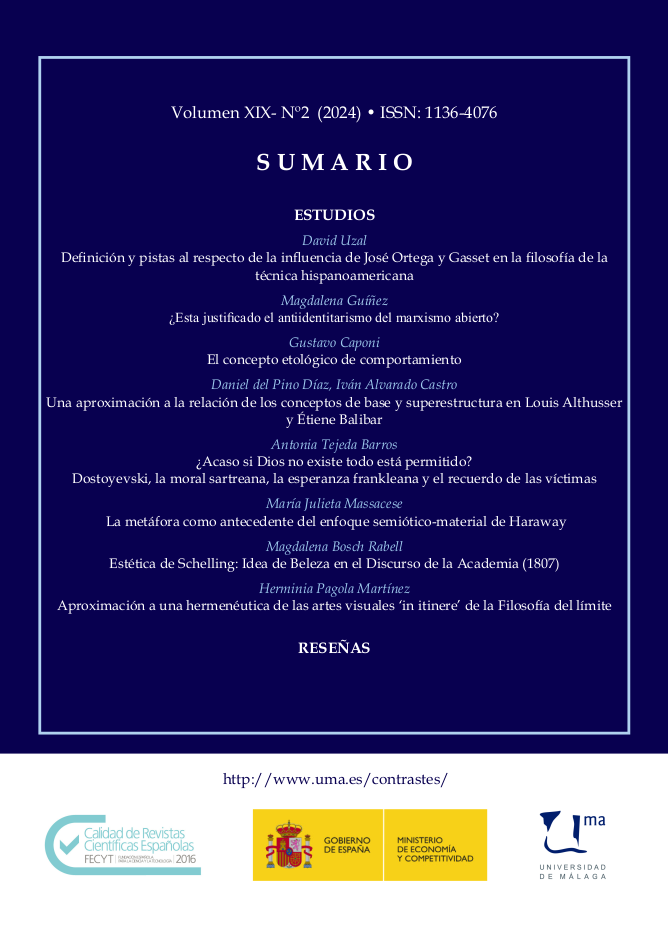Schelling’s Aesthetics: The Idea of Beauty in the speech Discourse of the Academy (1807)
DOI:
https://doi.org/10.24310/contrastes.29.2.2024.17541Keywords:
Schelling, Beauty, Aesthetics, Fine Arts Academy Speech, German Idealism, Romanticism, History of aesthetic thoughtAbstract
The Aesthetics of Schelling shows some peculiar qualities despite his Philosophy, in a more general view, shares essential contents with Fichte and Hegel. Although it is remarkably original, has been not very studied; in comparison with his Philosophy of Nature or his theory about the “I”. In this article the idea of beauty in the work of 1807: On the Relationship of the Plastic Arts to Nature” is analyzed. First, some context to understand the cited text and our study is offered. The second section shows how emerges the question of Beauty within the text we are studying. The next point is the analysis the way in which is realized the union of spirit and matter, and how is Beauty who makes it possible. The fourth section is devoted to Grace, understood as union of body and soul. Finally, other essential qualities of Beauty that compound its complete concept are analyzed.
Downloads
Metrics
References
BARTH, B. (1991) Schellings Philosophie der Kunst, Göttliche Imagination und ästhetische Einbildungskraft, Symposion, München: Karl Alber.
BAUMGARTNER, H. M. (Ed.) (1975) Schelling. Freiburg-München: Karl Alber.
BIERWALTES, W. (2000) "El neoplatonismo de Schelling", Anuario Filosófico, 33, pp. 395 – 442.
BLAUMER, M. (2006) Subjektivität und ihr Platz in der Natur, Untersuchung zu Schelling Versuch einer naturphilosphischen Grundlegung des Bewusstseins, Stuttgart: Kohlhammer.
BOSCH, M. (2016) “Significado estético del Sistema del Idealismo Trascendental”. Contrastes. Revista Internacional de Filosofía, vol. XXI-Nº2, pp. 57-73.
BOSCH, M. (2016) “Estética de Schelling: idea de belleza en Bruno (1802)”, Thémata. Revista de Filosofía, Nº 53, pp.: 219-23.
BRAUN, O. (1906) Schelling Geistige Wandlungen in den Jahren 1800-1810. Leipzig: Verlag Quelle &Meyer.
CATALDO SANGUINETTI, G. (2013) “Schelling o el arte como reconciliación”, Thémata. Revista de Filosofía, Nº48, pp.: 13-23, DOI: 10.12795/themata. 2013.i48.01
De TORRES, M. J. (1999) "Estética y religión en la filosofía del arte de Schelling", en Leyte, A. (Ed.) Una mirada a la filosofía de Schelling, Vigo: Universidad de Vigo.
DIETZSCH, S. (1978) Natur-Kunst-Mythos. Beitrage zur Philosophie F.W.J. Schellings. Berlín: Akademie Verlag.
GALÁN, I. (1999) El Romanticismo: F. W. J. Schelling o el arte divino, Madrid: Ediciones Endymion.
HARTMANN, N. (1974) Die Philosophie des Deutschen Idealismus, Berlin, New York: Walter de Gruyter.
KNITTERMEYER, H. (1947) Schelling und die Romantische Schule, München: Reinhardt.
LEYTE, A. (2014) "Lo infinito romántico". Suplemento de Contrastes. Revista internacional de filosofía, 19, pp. 205-222.
LÓPEZ DOMÍNGUEZ, V. (1999) "Estudio introductorio", Filosofía del arte, Madrid: Tecnos. p. XXI
MEIER, F. (1961) Die Idee der Transzendentalphilosophie beim jungen Schelling. Winterthur: Keller.
PEREZ, B. (2006) “Estética de la dignidad Y dignidad de la estética. Schiller y Schelling en 1795”, Estudios Filosóficos LV pp.: 307 -337.
SCHELLING, F. W. J. (1983) Über das Verhältnis del bildenden Künste zu der Natur, Hamburg: Philosophische Bibliotek. Felix Meiner Verlang.
SCHELLING, F. W. J. (2004) El “Discurso de la Academia”. Sobre la relación de las artes plásticas con la Naturaleza (1807). LEYTE, A. y CORTËS, H. (Traducción y estudio introductorio). Madrid: Clásicos del pensamiento. Biblioteca nueva.
WARNEK, P. (2004) "Scheling's Second Sailing", Epoché: A Journal for the History of Philosophy, 8 (2):195-214,
Downloads
Published
How to Cite
Issue
Section
License
This journal provides immediate free access to its content under the principle of making research freely available to the public. All content published in Contrastes. Revista Internacional de Filosofía, are subject to the Creative Commons Attribution-NonCommercial-ShareAlike 4.0 license whose full text can be found at <http://creativecommons.org/licenses/by-nc-sa/4.0>
It is the responsibility of the authors to obtain the necessary permissions of the images that are subject to copyright.
Authors whose contributions are accepted for publication in this journal will retain the non-exclusive right to use their contributions for academic, research and educational purposes, including self-archiving or repository in open access repositories of any kind.
The electronic edition of this magazine is edited by the Editorial Service of the University of Malaga (Uma Editorial), being necessary to cite the origin in any partial or total reproduction.









5.png)
